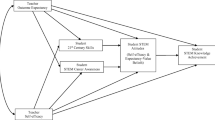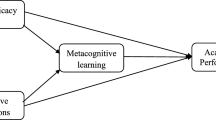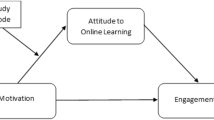Abstract
Many studies have defined science anxiety, attitude toward science and low science teaching self-efficacy. This paper attempts to show the interrelatedness of these traits, and using the construct of personal self-efficacy as a foundation, describe methods for building science teaching confidence in preservice teachers. Teaching self-efficacy beliefs refers to teachers' confidence in their own teaching abilities which is reflected in their teaching behaviors. To improve the ability, effectiveness and feelings of success in elementary teachers, science educators need to include strategies to improve attitudes toward science and increase teaching self-efficacy in teacher preparation courses.
Similar content being viewed by others
References
Akindehin, F. (1988). Effect of an instructional package on preservice science teachers' understanding of the nature of science and acquisition of science-related attitudes.Science Education, 72(1), 73–82.
Armor, D., Conroy-Osequera, P., Cox, M., King, N., McDonnell, L., Pascal, A., Pauly, E., and Zellman, G. (1976).Analysis of the school preferred reading programs in selected Los Angeles minority schools. (Report No. R-2007-LAUSD). Santa Monica, CA: Rand Corporation.
Ashton, P. (1984). Teacher Efficacy: A Motivational Paradigm for Effective Teacher Education.Journal of Teacher Education, 35 (5), 28–32.
Bandura, A. (1977). Self-efficacy: Toward a unifying theory of behavioral change.Psychological Review 84, 191–215.
Bandura, A. (1981). Self-referent thought: A developmental analysis of Self-efficacy. In J. H. Flavell and L. Ross (Eds.)Social cognitive development: Frontiers and possible futures (pp. 200–239). New York, Cambridge University Press.
Bandura, A. (1982). Self-efficacy mechanism in human agency.American Psychologist, 37 (2), 122–147.
Berman, P. and M. McLaughlin (1977).Federal programs supporting educational change, Vol. II: Factors affecting implementation and continuation. (Report No. R-1589/7-HEW). Santa Monica, CA: Rand Corporation.
Brookover, W., Schweitzer, J., Schneider, J., Beady, C., Flood, P., and Wisenbaker, J. (1978). Elementary school social climate and school achievement.American Educational Research Journal, 15, 301–318.
Czerniak, C. and L. Chiarelott. (1990). Teacher education for effective science instruction—a social cognitive perspective.Journal of Teacher Education, 41 (1), 49–58.
Denham, C. H. and J. J. Michael. (1981). Teacher's sense of efficacy: A definition of the construct and a model for further research.Educational Research Quarterly, 5, 39–63.
Enochs, L. G. and I. M. Riggs. (1990). Further development of an elementary science teaching efficacy belief instrument: A preservice elementary scale.School Science and Mathematics, 90(8), 694–706.
Gibson, S. and Dembo, M. H. (1984). Teacher efficacy: A construct validation.Journal of Education Psychology 76, 569–582.
Jaus, H. H. (1974). Using microteaching to change elementary teachers' attitudes toward science instruction.School Science and Mathematics, 74(5), 402–406.
Kramer, D. C. (1979). Science attitude change in preservice elementary teachers during an activity-oriented biology course.School Science and Mathematics, 79 (4), 294–298.
Shrigley, R. L. (1974). The attitude of preservice elementary teachers toward science.School Science and Mathematics, 74(4), 243–250.
Stefanich, G. P. and K. W. Kelsey. (1989). Improving science attitudes of preservice elementary teachers.Science Education, 73(2), 187–194.
Tobias, S. (1990).They're not dumb, they're different: Stalking the second tier. Tucson, AZ: Research Corporation.
Westerback, M. E. (1982). Studies on attitude toward teaching science and anxiety about teaching science in preservice elementary teachers.Journal of Research in Science Teaching, 19(7), 603–616.
Wollfolk, A. E. and W. K. Hoy. (1990). Prospective teachers' sense of efficacy and beliefs about control.Journal of Educational Psychology, 82 (1), 81–91.
Author information
Authors and Affiliations
Rights and permissions
About this article
Cite this article
Ramey-Gassert, L., Shroyer, M.G. Enhancing science teaching self-efficacy in preservice elementary teachers. J Elem Sci Edu 4, 26–34 (1992). https://doi.org/10.1007/BF03173752
Issue Date:
DOI: https://doi.org/10.1007/BF03173752




